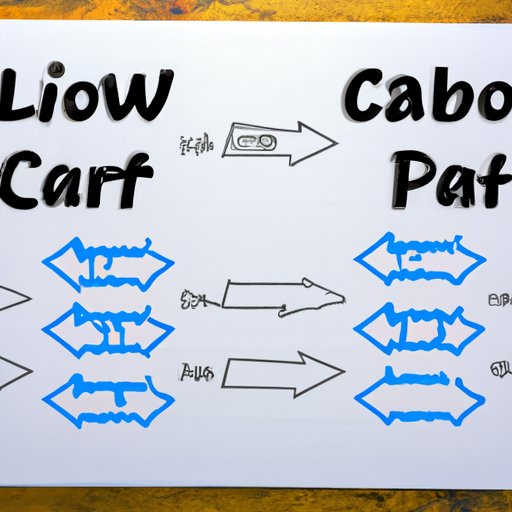Introduction
Low carb diets have become increasingly popular in recent years as a way to lose weight and improve overall health. A low carb diet is one that limits the consumption of foods high in carbohydrates such as bread, pasta, rice, and sugary snacks. The purpose of this article is to examine the pros and cons of low carb diets and explore the potential health benefits and risks associated with them.
Examining the Pros and Cons of Low Carb Diets
There are both advantages and disadvantages to following a low carb diet. Let’s take a look at some of the pros and cons.
Advantages of Low Carb Diets
One of the main advantages of a low carb diet is weight loss. Studies have shown that people who reduce their intake of carbohydrates tend to lose more weight than those who don’t. Additionally, low carb diets can help to reduce blood sugar levels, lower blood pressure, and reduce the risk of cardiovascular disease.
Disadvantages of Low Carb Diets
The main disadvantage of a low carb diet is that it can be difficult to stick to. This type of eating plan requires a significant lifestyle change and may not be feasible for everyone. Additionally, cutting out certain food groups can lead to nutritional deficiencies if not monitored carefully.

Exploring the Health Benefits of a Low Carb Diet
Let’s take a closer look at some of the potential health benefits of a low carb diet:
Weight Loss
As mentioned above, one of the primary benefits of a low carb diet is weight loss. A study published in the British Medical Journal found that people who cut back on carbohydrates lost an average of 4.4 pounds (2 kg) more than those who didn’t.
Improved Blood Sugar Levels
Low carb diets can also help to improve blood sugar levels. A study published in the journal Diabetes Care found that people who followed a low carb diet for 12 weeks had significantly lower blood sugar levels than those who followed a standard diabetes diet.
Lower Blood Pressure
Following a low carb diet has been shown to lower blood pressure. A study published in the journal Hypertension found that people who followed a low carb diet for six months had significantly lower blood pressure than those who followed a standard diet.
Reduced Risk of Cardiovascular Disease
In addition to improving blood sugar levels and lowering blood pressure, a low carb diet may also reduce the risk of cardiovascular disease. A study published in the American Journal of Clinical Nutrition found that people who followed a low carb diet for five years had a 32% lower risk of developing coronary heart disease than those who followed a standard diet.
Investigating the Latest Research on Low Carb Diets
The latest research on low carb diets shows both positive and negative results. Let’s take a look at some of the studies:
Studies Showing Positive Results
A study published in the journal Obesity found that people who followed a low carb diet for eight weeks lost an average of 8.8 pounds (4 kg) more than those who followed a standard diet. Additionally, a study published in the journal Diabetes, Metabolic Syndrome and Obesity found that people who followed a low carb diet for 16 weeks lost an average of 10.5 pounds (4.7 kg) more than those who followed a standard diet.
Studies Showing Negative Results
Not all studies have found positive results. A study published in the journal Nutrition & Metabolism found that people who followed a low carb diet for 12 weeks did not lose any more weight than those who followed a standard diet. Additionally, a study published in the journal PLoS One found that people who followed a low carb diet for six months experienced no more weight loss than those who followed a standard diet.
Looking at the Different Types of Low Carb Diets
There are several different types of low carb diets. Let’s take a look at some of the most popular ones:
Ketogenic Diet
The ketogenic diet is a very low carb, high fat diet. It typically consists of eating around 75% fat, 20% protein, and 5% carbs. The goal of this diet is to put your body into a state of ketosis, where it burns fat for energy instead of carbs.
Paleo Diet
The paleo diet is based on the idea of eating like our ancestors did, prior to the advent of modern agriculture. It focuses on eating whole, unprocessed foods such as meat, fish, eggs, vegetables, fruits, nuts, and seeds.
Atkins Diet
The Atkins diet is a low carb, high protein diet. It allows you to eat high-fat foods such as butter, cheese, and bacon, but restricts carbohydrates such as bread, pasta, and rice. The goal of this diet is to put your body into a state of ketosis in order to burn fat for energy.

Discussing the Potential Risks of Low Carb Diets
Although there are many potential benefits to a low carb diet, there are also some risks that should be considered. These include:
Dehydration
Following a low carb diet can lead to dehydration due to the increased production of ketones in the body. It is important to drink plenty of water when following a low carb diet in order to stay hydrated.
Nutritional Deficiencies
Cutting out certain food groups can lead to nutritional deficiencies if not monitored carefully. It is important to make sure you are getting enough vitamins and minerals from a variety of sources.
Fatigue
Another potential risk of a low carb diet is fatigue due to the lack of carbohydrates. It is important to make sure you are getting enough calories and nutrients in order to avoid feeling tired and sluggish.

Comparing Low Carb Diets to Other Eating Plans
Let’s take a look at how low carb diets compare to some other popular eating plans:
Mediterranean Diet
The Mediterranean diet is a plant-based diet that includes lots of fresh fruits and vegetables, whole grains, legumes, nuts, olive oil, and fish. While this diet does include carbohydrates, it is much lower in carbs than a standard Western diet.
Dash Diet
The Dash diet is a low sodium diet that emphasizes fruits, vegetables, whole grains, lean proteins, and healthy fats. This diet is higher in carbohydrates than a low carb diet, but still lower than a standard Western diet.
Vegetarian Diet
The vegetarian diet is a plant-based diet that excludes animal products. This diet is higher in carbohydrates than a low carb diet, but lower in saturated fat and cholesterol.
Conclusion
Low carb diets can offer many potential health benefits, including weight loss, improved blood sugar levels, lower blood pressure, and reduced risk of cardiovascular disease. However, it is important to be aware of the potential risks associated with these diets, such as dehydration, nutritional deficiencies, and fatigue. Additionally, it is important to compare low carb diets to other eating plans in order to make sure you are getting enough vitamins and minerals. Ultimately, it is important to consult with a doctor or nutritionist before starting any new diet.
(Note: Is this article not meeting your expectations? Do you have knowledge or insights to share? Unlock new opportunities and expand your reach by joining our authors team. Click Registration to join us and share your expertise with our readers.)
